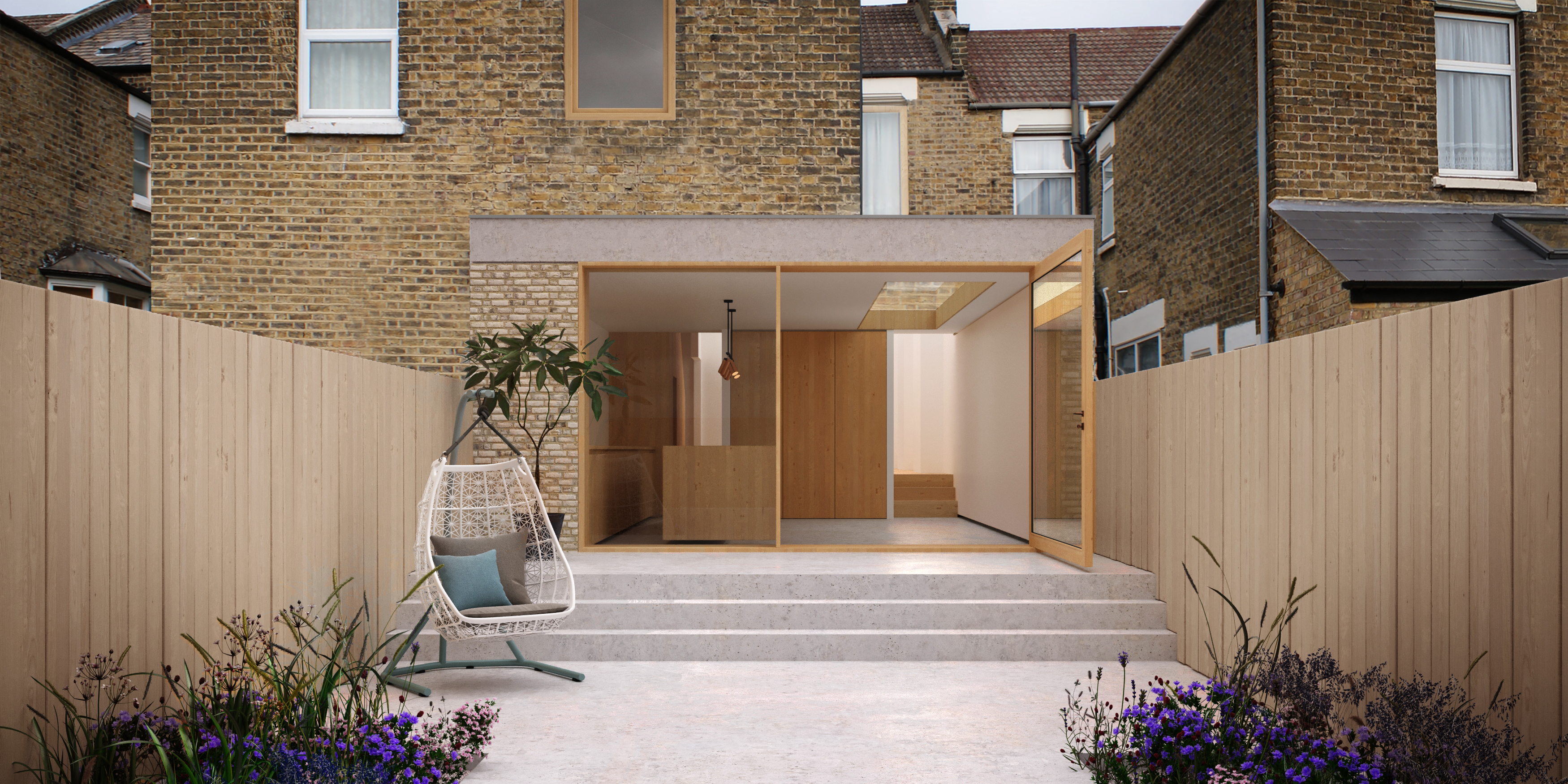Neighbours and the planning process
If you’re worried about a neighbour stopping your house extension plans, it’s very helpful right at the beginning of the project to assess this risk as it may inform design decisions as well as your personal handling of the situation.
Featured image from Tyrone, architect from Lambeth, London. See more and shortlist them for your home project here
Does your extension require planning permission or is it permitted development?
This is a critical question, as your neighbour would have less or no influence if the extension design falls within permitted development guidelines.
Neighbour objections to permitted development extensions
If you think your extension can be done under permitted development rules, we’ve written an article on neighbour objections to permitted development here: ‘Can a neighbour object to permitted development?’
In summary, your neighbour can have no influence on the development with regards to planning permission, as planning permission is not required. The exception to this would be if you are planning to take advantage of the Larger Home Extension Scheme under permitted development, which has its own particular process. This process does involves neighbour consultation – the objections of your neighbours will be taken into account and the larger extension may not be approved.
Neighbour objections during the planning process:
If planning permission is required – where your extension plans fall outside permitted development rules, or you don’t benefit from permitted development rights – your neighbour can submit a formal objection to your proposals.
Here is the typical process for a homeowner planning application. You may also want to refer to our article ‘How long does a planning application take (and how to avoid delays)‘:
- Once received, the application will be validated and registered. The eight week time-frame for a decision starts from this point.
- After validation the local planning authority will publicise* your application and receive any comments or objections. Anyone is able to comment on your proposals. The consultation period is 21 days from the date of publishing.
- The local planning authority will review all the comments/ objections received and will take those – which are relevant from a planning perspective – into consideration.
- The planning authority may then prepare a report for the planning committee (comprised of local councillors). You are entitled to see this report (including comments and objections raised) and it should be available three days before the committee meeting. It’s common for smaller / residential projects to be decided by a single senior planning officer instead rather than be considered by committee..
- The local planning authority will notify you of their decision.
*Where will your planning application be published?
Your surrounding neighbours will usually receive a letter with details of the application and details of how to comment or raise objections. A public notice is sometimes put up on, or close to, the site. The parish/town/community council will usually be consulted and sometimes the county council and Environment Agency too. Occasionally it can also be advertised in the local paper – but not usually for small/private residential projects. In all cases, the local planning authority will publish specific information about all planning applications on their website.
Speak to your neighbours prior to planning
It’s usually a very good idea to speak to your immediate neighbours before submitting your planning application. If the planning authority letter is the first they’ve heard of it, they may be affronted and this could work against you in the consultation process as well as during the course of the work. Keeping your neighbours happy and informed is one of the best ways to mitigate issues and disagreements both during planning and construction.
You may be able to resolve some of your neighbour’s issues prior to planning submission, which could save a lot of time and disruption.
Neighbours and other permissions
Planning permission isn’t the only statutory permission you might need. Here are some other typical statutory permissions that can involve neighbours.
Freeholder consent
It’s not uncommon for a neighbour to also own the freehold of your property. In this case, you will need to seek freeholder consent for your extension. First of all, you will need to read your lease agreement carefully and seek clarification from your solicitor if needed. Check that your lease covers the area you wish to extend into. If you don’t own the land, expect to pay for it. They will probably start with getting a valuation for your property as it stands, calculate the uplift in value the extension will create, and ask for a percentage of the profit you would make. Even if you do own the space, you should expect to pay fees relating to gaining the consent. The freeholder is likely to appoint a solicitor and structural engineer to check that your proposals are structurally sound and you will be liable to cover the cost of these services.
Restrictive covenants
Even if you do own the freehold to your property, you may be restricted or even prohibited from building an extension due to ‘restrictive covenants’. These are often historical restrictions contained in the titles to the property, where the original developer or council restricted the owner doing certain things. These restrictions are passed down from owner to new owner and can be very archaic.
Prohibiting the alteration or extension to a property is a common one. Even if the council is the enforcer, do not assume that gaining planning permission removes this restriction.
Party Wall Award
Do you share a wall or fence with a neighbour? Or even if you plan to excavate some ground near a neighbour’s property, you may need to have a Party Wall Award in place before starting work. You are legally obliged to give your neighbour one to two months’ notice (depending on what the works involve). If you’re unsure whether the Party Wall etc. Act applies to you, speak to your architect or find a Party Wall surveyor.
‘Right to Light’
This easement gives a homeowner rights to receive light through defined windows/openings in their house. This is separate to light issues that are relevant in a planning application, where separate daylight assessments would have been carried out. Even if planning permission has been granted, ‘Right to Light’ is a civic matter that can still be relevant and raised as an issue. In this case, surveyors and solicitors would need to be involved to assess and resolve the issue. Halting development completely or undertaking demolition is discretionary and it may be resolved by way of compensation instead.
Summary – Can a neighbour stop my extension?
In the significant majority of cases, a neighbour would not be able to completely stop your home extension plans. However, it’s worthwhile thinking about how you might be able to minimise or mitigate any conflict – which can cause disruption, additional costs and delays – early on in the design process. Talking it though, being completely transparent, and keeping neighbours on side from the beginning should make things much easier later on.
An experienced residential architect will have dealt with lots of neighbours before! They are well placed to offer their advice and tips on neighbour diplomacy as well as ensuring that everything you are doing meets all statutory regulations.
Finding the right architect for your extension
As well as being founder of designfor-me.com, I am also a qualified architect. I found that many homeowners search online to find well established or high-end practices (it makes sense – these companies have bigger marketing budgets with stylish websites). However, such practices are often too busy, too expensive and, in fact, often less experienced in dealing with small residential projects on ‘normal’ budgets.
So I wanted to create this platform for those design professionals I know who are suitable, experienced and eager to take on domestic projects like yours. They are often small practices or freelancers. The problem was that, before Design for Me, they were very difficult to find. All you need to do is tell us a bit about your project.
- Quickly see who’s interested in your job.
- Create a shortlist.
- Invite up to three for a no-obligation consultation.
Emily Design for Me

